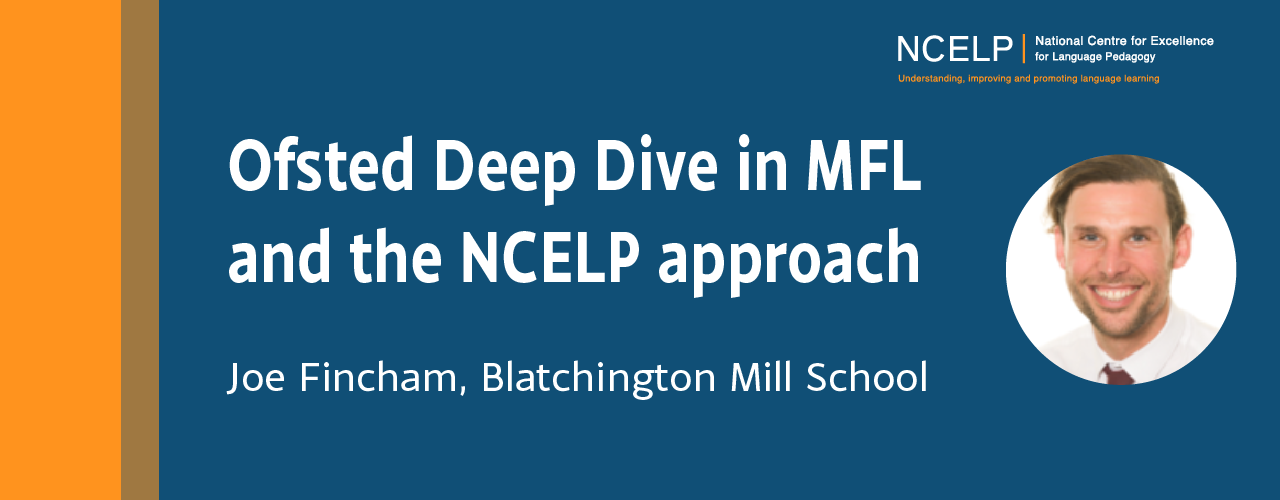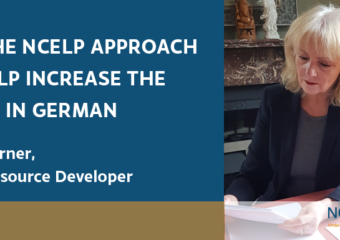In the following article, the Head of Department and NCELP Course Leader, Joe Fincham, shares his reflections upon the Deep Dive experience and how the department’s adoption of the NCELP pedagogy facilitated a positive outcome in their inspection.
Blatchington Mill School is a former Lead HUB School as part of the NCELP MFL HUB Programme. The languages department has been using the NCELP approach to language teaching for three years and uses the NCELP Schemes of Learning across all years in KS3. In February of this year, Blatchington Mill School was inspected by Ofsted and the languages department was selected for a Deep Dive.
As part of the Deep Dive into the languages department at Blatchington Mill School, one inspector from the team of inspectors was assigned to the department and conducted the Deep Dive in its entirety. The Deep Dive was then carried out in the following format:
1) Deep Dive Interview with HOD
2) Learning walk observations of members of the department teaching a variety of year groups (accompanied by HOD)
3) Work scrutiny of student books with HOD
4) Student voice interview panel (accompanied by HOD)
5) Departmental staff voice interview panel (without HOD)
Joe’s Reflections
During the initial interview with the inspector assigned to our department I was asked a variety of questions. I was asked:
- Whether our GCSE uptake figures are in line with the government’s national ambition that 75% of students nationally opt for a language at GCSE by 2022.
- How our Schemes of Learning are sequenced and planned to ensure sufficient student progress towards identified end points.
- What subject content has been identified as most useful for teaching and why.
- What the structure of an effective lesson looks like in our department and what we are likely to see during the learning walk with regards to teaching and learning.
- How we ensure consistency across the department and whether there are any areas for improvement or development that have been identified.
The department’s adoption of the NCELP Schemes of Learning and pedagogical principles were of immense value when responding to these questions. The NCELP curriculum design principles have been usefully cross-referenced with the key evidence criteria from the Ofsted Framework. As part of my preparations for the interview I found the ‘New Ofsted Framework and NCELP’ document from the NCELP Resource Portal extremely useful.
Using this document as my guide I was able to show how our NCELP Schemes of Learning are logically sequenced, and that learning is carefully planned to support progression for our learners at KS3 within a low exposure foreign language setting. Furthermore, I was able to show that by using NCELP’s language-driven curriculum, student progression is underpinned by a developing core knowledge of grammar, vocabulary and phonics and evidenced by steadily increasing and ever more confident independent communication. The end points of learning at KS3 are defined and assessed discretely by knowledge strand and holistically as applied knowledge:
The NCELP curriculum design principles have been usefully cross-referenced with the key evidence criteria from the Ofsted Framework.
- Phonics – student confidence in transcribing and reading aloud the key Sound Symbol Correspondences, as set out in the new GCSE Subject Content.
- Vocabulary – the learning and retention of around 360 (mostly high frequency) words per year at KS3 and KS4.
- Grammar – student ability to use core grammar features taught and revisited over KS3 and KS4, as set out in the new GCSE Subject Content annexes.
Building confidence
The goal (and result) of this knowledge building is confident communication. We situate our students’ language learning in relevant and rich cultural contexts. Lesson by lesson we provide opportunities for our learners to apply their knowledge, to build sentences independently in interaction tasks. We assess this development using more holistic proficiency tests.
Our very positive discussions during the Deep Dive highlighted the logical, sequential nature of language learning within a language-driven curriculum. The inspector was able to see how the content of our Schemes of Learning had been very carefully selected in order to maximise student progress. In addition, using NCELP lesson resources has strengthened the consistency of approach across our team and ensured that students have a parity of lesson experience. This was something that was observed by the inspector in lessons. During both the learning walk and the work scrutiny, the inspector was able to see the significant progress that students were making. There was clear evidence that students were incrementally building their phonics knowledge and ability to pronounce the target language. The gradual accumulation of word knowledge, through the learning of ten to fifteen lexical items each week was evident, and the selection of vocabulary informed by frequency rather than topics was something that the inspector was very interested to see. The logical sequencing (according to frequency and complexity) in the teaching of grammar features also correlated to student confidence in the classroom, with older students showing that they were more confident and resilient when completing tasks that required more complex grammatical knowledge.
Using NCELP lesson resources has strengthened the consistency of approach across our team and ensured that students have a parity of lesson experience.
Student feedback
With regards to the student voice panel, the difference in levels of motivation and enthusiasm between students that are learning using the NCELP approach and those in older years (who are not) was stark. At present, our KS4 year groups are following the GCSE topic-based syllabus and were not taught using the NCELP Schemes of Learning at KS3).
Our KS3 students were extremely positive about their learning and felt that they were making significant progress in their lessons. This contrasted with some of our older learners who said they lacked some confidence in their language learning and that although they were making progress, they often felt that language learning was overly challenging, and that the GCSE course was too difficult.
Final thoughts
Overall, our experience as a department of the Deep Dive was a positive one and the alignment of the NCELP approach with the Ofsted Framework facilitated this. The inspector was encouraged to see the journey our department has been on over the last three to four years as we have been adopting NCELP principles and evolving our practice.




